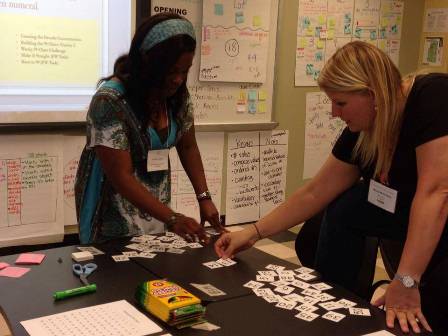In the
third-floor classrooms of Tucker High School last week, as summer heated
asphalt outside, Georgia math teachers were huddling in circles sharing
strategies, or perching on chairs to sketch out graphs, or gathering, by hand, the
statistics associated with dolphin-therapy patients.
As the job
market changes and the reach of technology spreads, it is as important as it has
ever been for students to leave their schooling with a strong understanding of
mathematical concepts. Rigorous math and science standards are increasingly seen
as key components of global competitiveness.
That means
students – even those who struggle with math, for whom it does not come
naturally – need math, and need the logic skills and critical thinking it
sharpens.
In those
rooms at Tucker High School, teachers took up that task. It was the first of
seven Mathematics Summer
Academies offered by the Georgia Department of Education, all featuring
sessions led by Georgia educators.

“Guided by
teacher feedback and supporting research findings, the 2014 Mathematics Summer
Academy Program will offer the same series of interactive grade level/high
school course sessions at each site,” said Sandi Woodall, director of GaDOE’s
mathematics program. “Each session is focused on the enhancement of content
understanding for the particular grade level or high school course that the
participant teaches. A cadre of Georgia’s master educators crafted the content
for the fifteen 12-hour courses and will deliver the professional learning experience
to peers within this summer’s academy program.”
At the Tucker
workshop, Coordinate Algebra teachers collected their own personal data –
birthday month, miles traveled to reach the high school – on sheets of white
paper taped to the walls, then experimented with ways students could learn to
display and examine similar data.
Analytic
Geometry teachers carefully folded tissue-thin paper into parabolas, talking as
they worked about interactive learning and how to show a concept so that it
provokes real understanding, rather than simply talking about it. They
practiced grading formative assessments. They discussed ways to challenge
students to go further, rather than experiencing the mental shut-down that
difficult subjects sometimes provoke.
Kindergarten
teachers worked on their questioning strategies, practicing on each other – one
teacher in a pair taking the place of a kindergarten student, displaying their
pitch-perfect understanding of how a five-year-old would react, what they would
say, and what tone they would say it in. They worked on using questions to
narrow down that five-year-old understanding, to grasp what the student really
knew and fill in the gaps.
Teachers
across content areas explored curriculum resources. They discussed ways to personalize
learning and address the needs of the struggling student, the on-target student
and the accelerated student alike. They spent time unpacking common
mathematical misperceptions (if there is a 50 percent chance of rain on
Wednesday and a 50 percent chance on Thursday, for example, the probability of
it raining both days is not 50 percent).
In every room
was an effort to get beyond “pure math” and reach “contextual math” – math that
students can understand because they can see it in context.
“They love
that context,” instructor Adrian Throop told a room full of teachers. “They
don’t know that they love statistics.”
For some
adults, math is a blur – something struggled with in childhood and glazed past
in adult life – but, when genuinely understood, it can open up countless doors.
The math
instruction taking place in Georgia is the exact opposite of throwing out
information and hoping it hits. Teachers are putting in the hours necessary to
teach kids math that they can experience – math they can understand.
And, as they
do, those doors will swing open for students.

